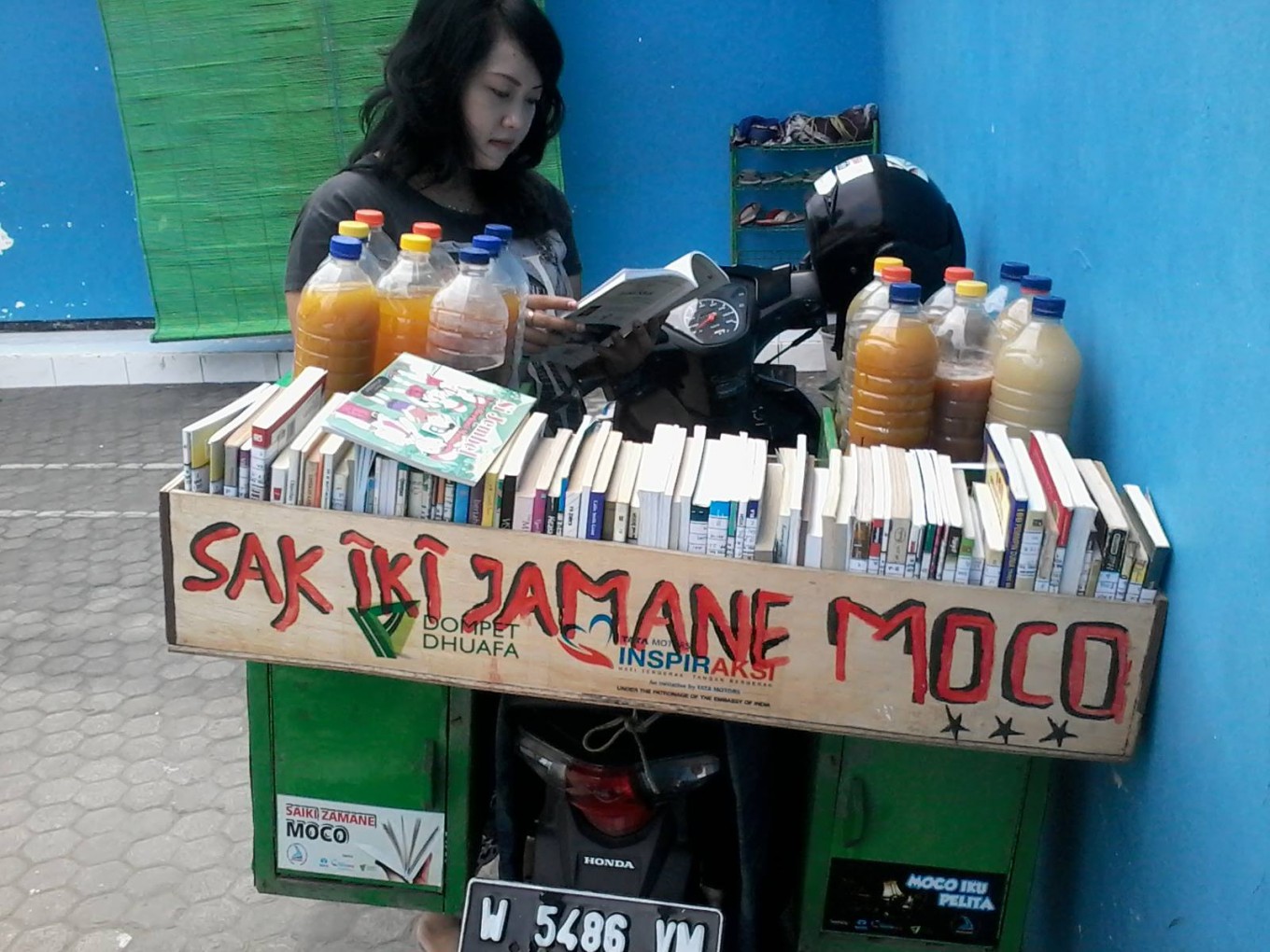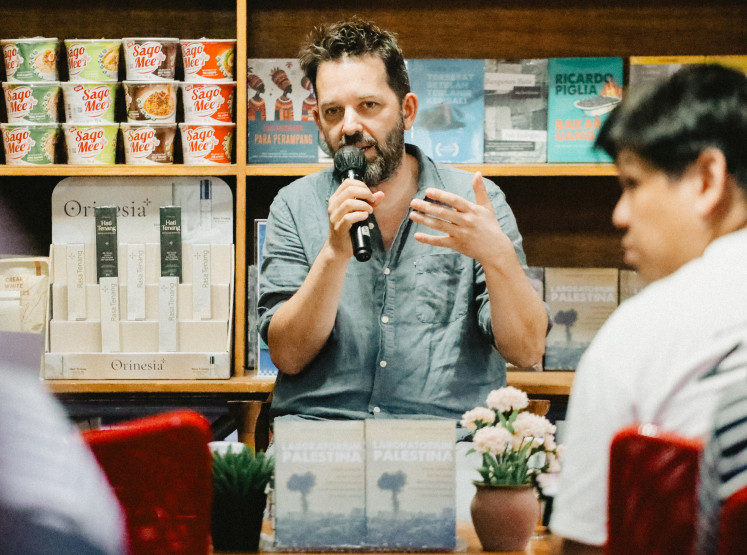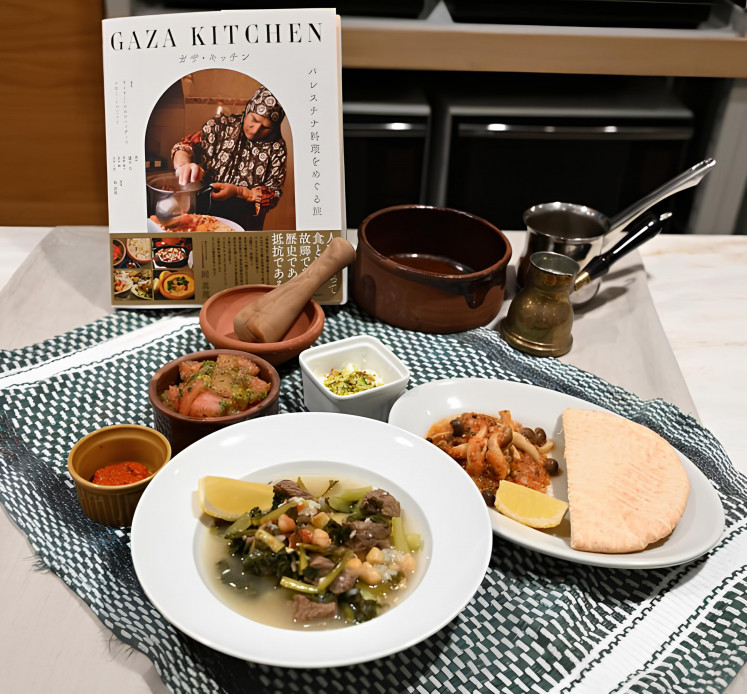Popular Reads
Top Results
Can't find what you're looking for?
View all search resultsPopular Reads
Top Results
Can't find what you're looking for?
View all search resultsMixing books with herbal drinks
A man from East Java mixes books with herbal drinks to improve local people’s interest in reading.
Change text size
Gift Premium Articles
to Anyone
F
or Muhammad Fauzi or Fauzi for short, drinking jamu (herbal beverage) is not complete without reading a book. After dawn prayer, Fauzi poured jamu, a traditional Javanese herbal drink, into 18 bottles. He then put them in a wooden green box he installed to the passenger seat of his motorcycle.
He then lifted 74 books of various topics, ranging from parenting, health, religion to politics, and put them in the same box decorated with an eye-catching message that reads Sak Iki Jamane Moco (Now is The Era of Reading).
“These books are for my customers,” he said while heating up the engine of his motorcycle at his home in Sidoarjo, East Java.
At 6:30 a.m., he left his home. When he returned at 11:30 a.m., he said five people had borrowed his books that morning.
Since 2013, Fauzi, who is just a junior high school graduate, has been carrying books while selling jamu in an attempt to improve the literacy rate in his area.
(Read also: Iman Suligi: Literary hero for children)
The idea for the mobile bookborrowing service popped up when he felt that not many people were borrowing from his library despite his increasing book collection.
“Now, I have around 7,000 books,” he said of his library, which he called Taman Ilmu Masyarakat (The Garden of Knowledge).
The library was established in 2011 and 80 percent of its collection came from people’s donation while the rest were his.
Fauzi, who has been selling jamu since 2007 to continue his grandmother’s business, says he always encourages his customers to read books he brings while they are enjoying his various types of herbal beverages, such as beras kencur (mixed rice and herbal ice tea), kunyit asem (tamarind and turmeric) and kudu laos (noni fruit, galingale and tamarind).
“I just want to facilitate people who want to read books but don’t have time to go to the library,” the 34-year-old father of two said, adding that around 100 of his books were borrowed every month.
He said that most of his customers who borrowed his books were factory workers because he usually stood by at factories where the workers liked to drink his jamu to give their endurance and stamina a boost.
When asked about the number of his customers who routinely borrowed his books each day, he answered about five to 10.
“To find people who like to read books is difficult,” he said.
According to a recent study conducted by Central Connecticut State University, Indonesia was ranked second lowest out of 61 countries for its facilitation of literacy activities, with factors ranging from the number of libraries and newspapers to years of schooling and computer availability.
(Read also: Kawabata first nominated for Nobel Prize in Literature in ’66)
Meanwhile, the United Nations Development Program (UNDP) recently reported that only one out of 1,000 Indonesians were passionate about reading.
Fauzi explains that customers who are not interested in borrowing his books often say that they do not have time to read at their workplaces. Therefore, to overcome such a problem, he always offers them to take his books home for a two-week loan period.
Sometimes, he said, his customers had lost his books or returned them in a damaged condition. However, he did not ask them to pay a fine or scold them because he was afraid that they would stop borrowing his books.
“I don’t scold them because I do not want them to feel guilty. What I am trying to do now is to grow people’s reading habits,” he said. In some cases, his customers, who had not returned his books yet, moved somewhere else without telling him about their new residences, he added. Such bad experiences, however, have never reduced his spirit to devoting his life to literacy.
Fauzi, who earns around Rp 1 million (US$74.7) a month from selling jamu, can spend almost Rp 200,000 to buy used books at Porong Market in Sidoarjo, East Java, once every two weeks.
He said his motivation to help people have books to read ignited from his childhood experiences when his parents could not afford to buy him books and bear the cost of his education.
To avoid such tragic experiences for others, he then initiated the library and developed it into a mobile library serving herbal drinks.
According to Fauzi’s observations, people want to read books if they contain information they need.
Therefore, when he meets customers, he will often query them about any problems they may have. Factory workers, for example, often complain about health problems, where then he will propose books on health that he considers are suitable for them.
“They do not want to read books probably because they feel they do not need them. So, we direct them to think that books offer solutions for all kinds of problems they face.”
However, having a library is not enough for Fauzi, who received an award from the National Library (Perpustakaan Nasional) in August 2016 for his dedication to developing a library and reading interest in the country.
Three years after establishing the library in 2011, he opened a free-of-charge early childhood education center, kindergarten school and elementary school at his 162-square-meter house under the name of the Bustanul Hikmah Sukorejo Foundation. Founded in March 2016, the foundation now has six teachers and 45 students.










